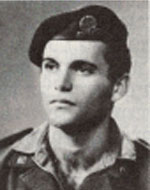Jadidi, Benjamin
Benyamin ben Nisan and Bat Sheva was born on March 19, 1946, in Meshed Parsia in 1950. His family immigrated to Israel after many hardships in 1950. Benjamin was drafted into the IDF in mid-November 1965. After basic training, he volunteered for the paratroopers, underwent a platoon commander’s course and was assigned to a paratroopers’ paratroopers unit. In April 1968, after completing his regular service in six months, he was sent to an officer’s course, and later took part in a course for reconnaissance officers, among whom he loved serving in the Israel Defense Forces, and participated in many daring operations, such as Samuel, Karameh, The airport of Beirut, Naja-Hamdi, etc. In all of them he excelled in his decision-making abilities and his clear mind, “Matan Vilnai wrote:” As a soldier and a commander in the Paratroopers Brigade, he was excellent and one of the outstanding members of this elite group. In all the activities he took part in, he performed his duties above and beyond the accepted norm. “In September 1969 he was discharged from the IDF and returned to the Menara. For him the continuation of life in the agriculture was understandable and natural. He married his girlfriend, Miri, who came to the farm in the framework of the Talmud Torah, and in the course of time they were born to the daughter of Inbal and son of-Dani, who gave his son his name in memory of his friend Danny Dror, who served in the paratroopers and fell in the Six Day War in the Old City . Among them was the orchard branch in the agriculture and when a crisis occurred in the cotton industry, he agreed to take over the concentration, since he was the only person who could save him. He did his work with great devotion, with all his Lev and with all his might. He was elected as a member of the secretariat of the agriculture and was a member of the members committee When the Yom Kippur War broke out he was summoned to his unit. He commanded a reconnaissance unit on the Golan Heights, since shortly before the war he moved to a unit within the Armored Corps. In a letter he wrote at the height of the war, he writes: “Things have happened here that we have been taught to think for years, but I think that the difficult stages are already behind us. I fought in the Six Day War, but much harder … The only one who is helping us at night is the moon … “On the circumstances of his fall, Maj. Gen. Peled writes to his family:” Our division launched the counter-attack on the Syrian army in the southern Golan Heights. We left Mazmah, on Monday morning, through Ein-Gev, al-‘ATo Ma’ale Gamla, to Rafid Junction and to Hoshenia. On Wednesday night, the entire Golan Heights were in our hands. But the war continued along the Syrian border and beyond, in an enclave. On the 19th of Tishrei 5740 (October 19, 1973), in the fighting on the other side of the purple line, Binyamin was hit by an artillery bombardment while he was helping the battalion commander. ” He was brought to eternal rest in the cemetery in Manara. He left behind a wife, daughter and son, mother, sister and brother.
